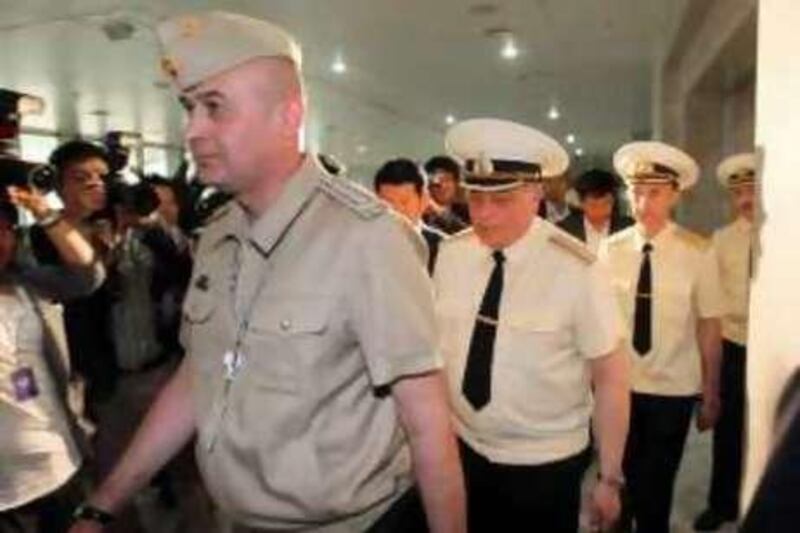BEIJING // After the sinking of a navy ship in March, South Korea had been widening its campaign to convince sceptics that Pyongyang was responsible for the fatal attack and to deliver punitive measures against North Korea at the UN Security Council.
Now, after an international inquiry determined that North Korea was the culprit, analysts are shifting their attention to a key question, which has been overlooked: why did North Korea carry out the attack? Answering this question is critical for South Korea to persuade China and Russia, two traditional allies of North Korea, to back action against Pyongyang. Both are veto-wielding permanent UN Security Council members that can scupper Seoul's effort to mete out the world body's official condemnation against North Korea.
"If North Korea indeed did it, why would it have done it? This is the question that has not been answered. And it bothers me," said Leonid Petrov, a Russian analyst on inter-Korean affairs, who now teaches at the University of Sydney. Russia has dispatched a team of investigators to Seoul, who were briefed by Seoul officials yesterday. The Russian team, composed of experts on torpedoes and submarines, plans to inspect the wreckage and visit the site of the sinking. It hopes to finish its investigation by early next week.
In the debate around the Cheonan, the ship that was sunk, some analysts pointed out, the Russian factor has been overlooked. "Given that South Korea and Japan are working with the US to bring the issue to the Security Council, one element in Chinese calculations will be Russia's position on the investigation results," said Stephanie Kleine-Ahlbrandt, the North East Asia project director for the International Crisis Group, a non-partisan think tank that advises governments.
"China is averse to diplomatic isolation, so it will probably act to avoid being alone in the opposing camp." Seoul has also asked Beijing to send its own experts, but has not received a response. Some South Korean media said China has already rejected the offer. The Russian foreign ministry said it needs "100 per cent proof" of the North's involvement. "A '100-per cent proof' is a politically loaded demand that scientific evidence is unable to meet," said Tong Kim, a former US state department official, who participated in past negotiations between North Korea and the US.
Mr Kim believes that Russia is likely to accept the South-led results in the end. "Now is a time for raising questions and answering them," Mr Kim said. In his meeting with the Chinese president, Hu Jintao, last month in Beijing, Kim Jong Il denied his country's involvement. The North Korean leader said there was no reason to carry out the attack. But South Koreans see many reasons. Foremost among them is the view that the attack was driven by revenge. In November, in the same area that the Chenoan was sunk, a North Korean patrol boat retreated after a clash, engulfed in flames and smoke, while a South Korean naval vessel was only lightly damaged.
North Korea had warned that South Korea would pay a "dear price". Lee Hee-ok, a North Korea analyst at Sungkyunkwan University in Seoul, also sees the clash as a major reason. But he disagrees with the interpretation that Mr Kim ordered the carefully pre-medicated attack himself. After the humiliating November defeat, North Korea demoted Kim Kyuk Sik, stripping a star away from the four-star general and sent him to the West Sea, the disputed sea border region.
"The message was clear enough. Kim Jong Il didn't have to say it to the general. The general had to recover the North Korean navy's honour and prove his loyalty," said Mr Lee in Seoul. South Korean media outlets cited other reasons, including the goal of instigating public fear and confusion that would divide South Korea, to deflect the North's domestic discontent after the recent failure of a poorly planned currency reform, and to prop up unity inside the country by creating an external crisis.
Over the weekend, Pyongyang mobilised a conspicuous protest of 100,000 people against South Korea and the US, accusing the allies of fabricating the whole matter. Other observers think the North's prime aim is to promote Mr Kim's heir designate, his third son, Jong Un, as "the hero who masterminded the successful attack". Some also viewed that Mr Kim wanted to break the deadlock in the standoff with the South by destabilising the situation in which the South's hard-line president, Lee Myung-bak, had been refusing to engage the North. Mr Kim believed there would not be any military retaliation from the South and the Obama administration, for fear of widening tensions.
"Of course, there should be consequences. But nobody wants a war," said Mr Kim, the former US official. The North would also have thought that the UN would not respond in a resolute manner as China and Russia would confront the US. Analysts also said that North Korea was attempting to engineer a situation where the whole world is paying keen attention to it. "North Korea sought Obama's attention, but Obama didn't pay attention to it. But, this time, I think the North achieved it," Mr Petrov said.
sleethenational@gmail.com





